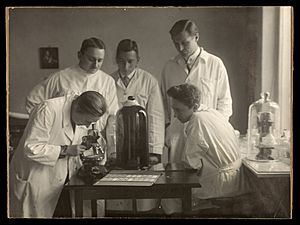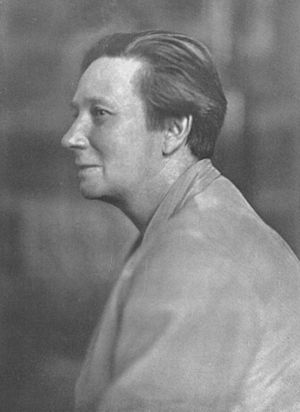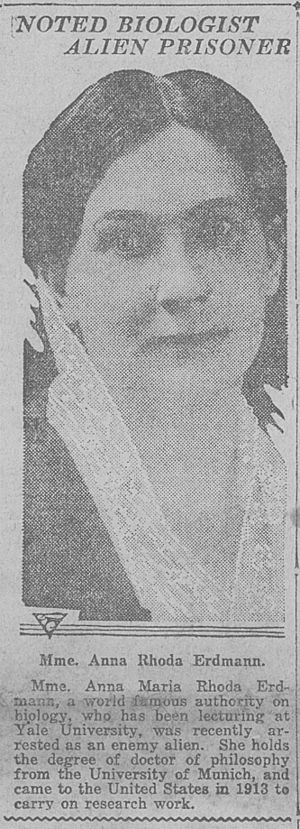Rhoda Erdmann facts for kids
Rhoda Erdmann (born December 5, 1870 – died August 23, 1935) was a German cell biologist. She was a pioneer in the study of cells in the early 1900s. She was also one of the few women working in science at that time.
Erdmann focused on how tiny organisms called protozoa reproduce. She was very interested in growing cells outside the body, which is called in vitro (meaning "in glass") or tissue culture. Her work with protozoa led her to a teaching job at Yale University in America. However, her time there ended early because of anti-German feelings during World War I. After being forced to leave America in 1919, Erdmann started research at the Institute for Cancer Research in Berlin. There, she created Germany's first department for studying cells through experiments. She became a full professor in 1929. Sadly, her work was stopped again in 1933 when the Nazis came to power. She lost her professorship and died in Berlin in 1935.
Contents
Early Life and Education
Rhoda Erdmann was born in Hersfeld, Germany, on December 5, 1870. Her parents were Anna Maria and Dr. Heinrick E. Erdmann, a high school teacher. She grew up in a family with many scientists and doctors. Rhoda went to St. John's school for girls in Hamburg. There, she trained to become a teacher for older girls.
Rhoda Erdmann's Career in Science
After passing her teaching exam in 1892, Rhoda Erdmann taught in England and Romania. She then worked at a public school in Hamburg starting in 1899. In 1900, she earned top honors in her teaching exam.
Starting Her Scientific Journey
In 1903, Erdmann left teaching to study more. She took classes in zoology (the study of animals) and botany (the study of plants) in different cities like Berlin and Munich. She also worked with live animals at the Naples Zoological Station. In 1907, she passed a special university exam. She earned her Ph.D. in biology from the University of Munich in 1908. Her main project was about the parts of a developing sea urchin egg. This work helped her become known as a protozoologist. She was one of the first women in Germany to earn a Ph.D., as women were only allowed to do so starting in 1900.
Research and Work in America
After getting her Ph.D., Erdmann worked as a research assistant in Berlin from 1908 to 1913. She tried to create vaccines against certain viruses in chickens. In 1913, she received a special grant to study cells at Yale University in the United States. At Yale, she worked on ways to grow cells outside the body.
After her grant ended, Yale asked her to stay as a lecturer. This was a big deal because Yale had to change its rules to allow a woman to be a faculty member. From 1915 to 1918, she was a faculty member at Yale. She was the first woman on the Yale Graduate Faculty. She also spent summers at the Rockefeller Institute studying how to grow tissues. Erdmann successfully grew chicken bone marrow cells. This work was very important for future studies in blood science and viruses. Her research on how tiny organisms called Paramecium survived also gave important clues about cell aging and how traits are passed down.
Challenges During World War I
Rhoda Erdmann's work in America was interrupted by World War I. People became suspicious of German citizens. Because she was German and worked with biology, some people thought she might be growing harmful bacteria. In 1918, she was wrongly accused of trying to poison water and spread chicken diseases. She lost her job at Yale and was held for several months. She was later sent back to Germany.
Building a New Institute in Germany
It was hard for Erdmann to find work when she returned to Germany. After a year, she got a job at the Institute for Cancer Research in Berlin. There, she created a new department for experimental cell research. This was the first of its kind in Germany. She became a faculty member in the Zoology department in 1920. By 1929, she was promoted to Associate Professor. In 1930, her department became its own institute, called the Institute of Experimental Cytology, and she became its director.
At her institute, she brought in the tissue culture methods she learned in the U.S. One of her big discoveries was showing that cancer could spread through liquids containing viruses. She was also the first German woman to lead a university institute. Erdmann also started a science magazine called Archiv für experimentelle Zellforschung in 1925. She was its editor until she died. She also helped create an international group for experimental cell research.
Facing Challenges from the Nazis
When the Nazis came to power in 1933, Rhoda Erdmann was banned from her laboratory. She was wrongly accused of being Jewish. When that was proven false, she was accused of helping her Jewish students find jobs and leave the country. Her institute was closed, and she was forced to retire. She was held for two weeks in 1933, but was released due to pressure from other countries. However, in 1934, the German government opened another institute for experimental cytology under her leadership. She continued to work until her death.
Rhoda Erdmann died in Berlin on August 24, 1935, at age 64, from a heart attack.
Rhoda Erdmann's Legacy
In 1992, a research fund was created in Dr. Erdmann's name by a European tissue culture group. In 2016, the Rhoda Erdmann House opened at Humboldt University of Berlin. This building is known as the "Green Amoeba" because of its curved shape and green metal outside.




